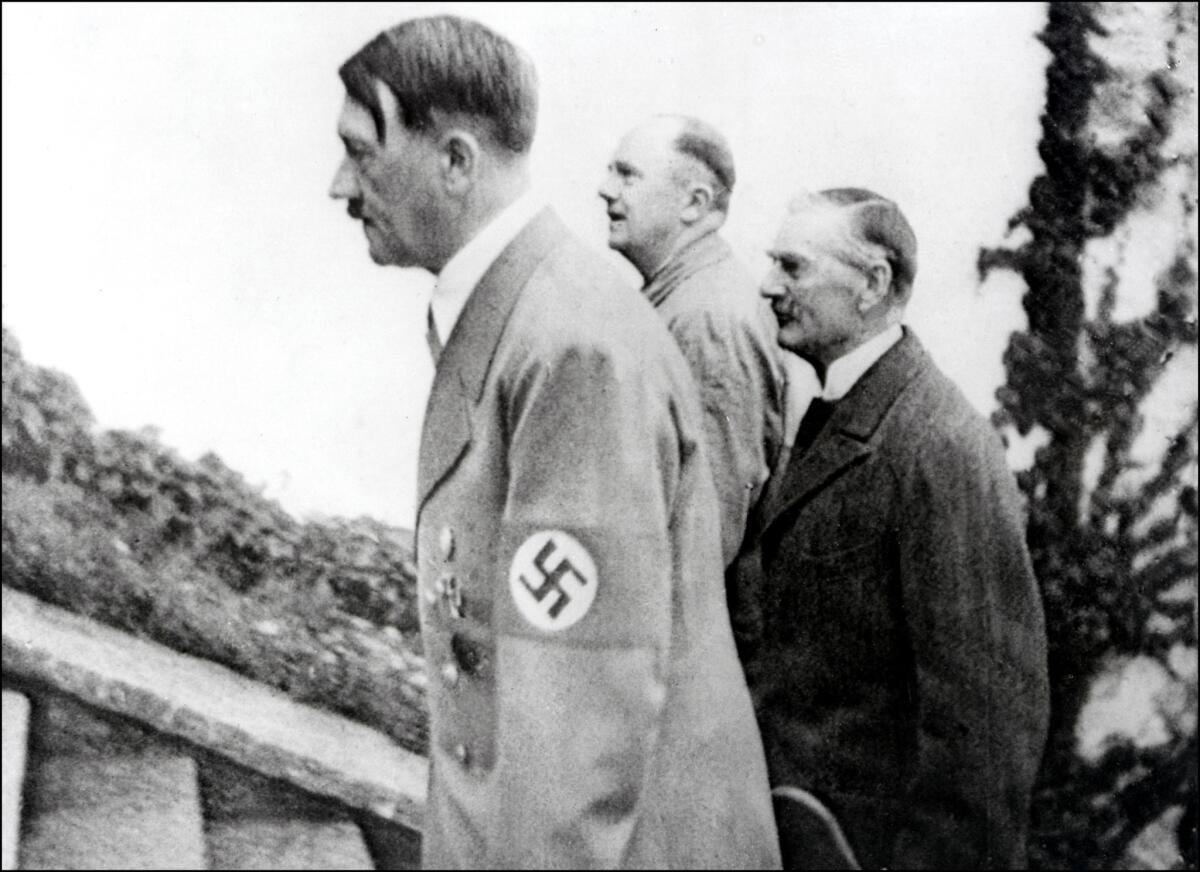John Kerry isn’t Neville Chamberlain; he’s John Lennon

- Share via
Is John F. Kerry the 21st century’s Neville Chamberlain? And is it true that those who fail to learn from history are doomed to repeat it?
Certainly that’s what critics of the nuclear deal with Iran that the secretary of State helped negotiate are saying. On Monday night, for instance, on Sean Hannity’s show on Fox, the conservative host made no bones about his views, showing the famous newsreel clip of Chamberlain waving a piece of paper on his return to Britain, touting his pact with Adolf Hitler.
And we all know how that one worked out.
Appeasement — it’s such a nasty word. Appeaser — it’s certainly not something any politician wants to be called.
But before the right wing and fervent supporters of Israel go completely around the bend on the Iranian nuclear issue, with dire warnings of another world war, consider this:
We had two world wars in the 20th century. The first, the “war to end all wars,” was preceded by an arms race. Great power alliances then drove those nations to war, sparked by the slightest of incidents — the assassination of Archduke Franz Ferdinand, nephew of Emperor Franz Josef and heir to the Austro-Hungarian Empire.
After the war, an exhausted Europe “learned” from history. Never again should great nations be drawn into war over minor transgressions. Never again should an arms race be allowed to imperil the world.
And then along came Adolf Hitler. The German Führer slipped through the cracks of such thinking. Yes, perhaps he could’ve been stopped. Certainly he should’ve been stopped. But Europe had learned from World War I, and that lesson was not lost on Neville Chamberlain.
World War II cost millions of lives. It gave us the Holocaust. And after it was over, the world learned another history lesson: the danger of appeasement. And the politicians who learned that lesson brought us, among others, the Korean War, the Vietnam War, the Persian Gulf War and the Iraq War.
In my college days, a wise professor who had spent years studying international relations and war told me something I’ve never forgotten. Two things lead to war, he said: arms races, and appeasement.
“In other words, war is inevitable?” my young self gasped.
“Yes,” he said.
Many folks like to say that man is a peace-loving creature. Many Americans like to say that Americans, especially, are a peace-loving people. But all evidence to the contrary. The history of man is one of conflict. The history of America is one of conflict. Just go back and count how many wars we’ve fought since the Revolutionary War that gave birth to this country.
In reality, America is the pit bull of peace.
So which history lesson should we apply to the Iran deal? Will it prove to be appeasement, with tragic consequences? Or will it spark an arms race, with equally tragic consequences?
The answer, frighteningly, is probably “yes.”
Which isn’t a very peaceful thought as we head into the holiday season. So I’ll offer another history lesson of a sort — from a great 20th century philosopher — as my defense of Kerry, and President Obama, and everyone else who hopes this deal with Iran works out:
“All we are saying is give peace a chance.” — John Lennon.
ALSO:
Conspiracy theories: Why we believe the unbelievable
Honest, FDA guys, my wife made me take that 23andMe test
The human side of poverty: Why poor people make bad decisions
Follow Paul Whitefield on Twitter @PaulWhitefield1 and Google +
More to Read
A cure for the common opinion
Get thought-provoking perspectives with our weekly newsletter.
You may occasionally receive promotional content from the Los Angeles Times.










